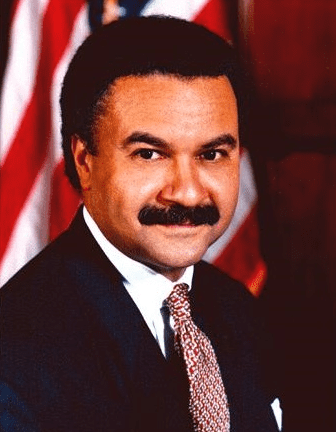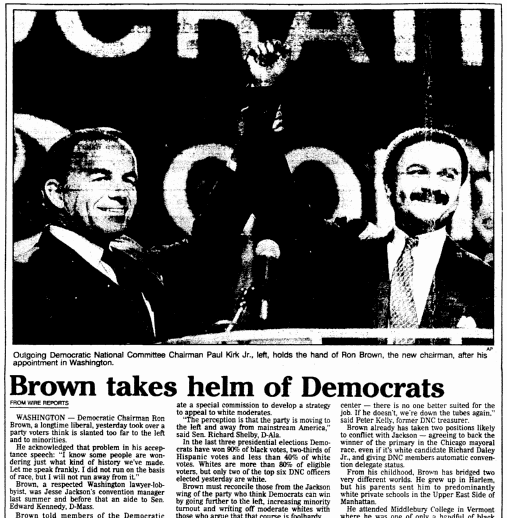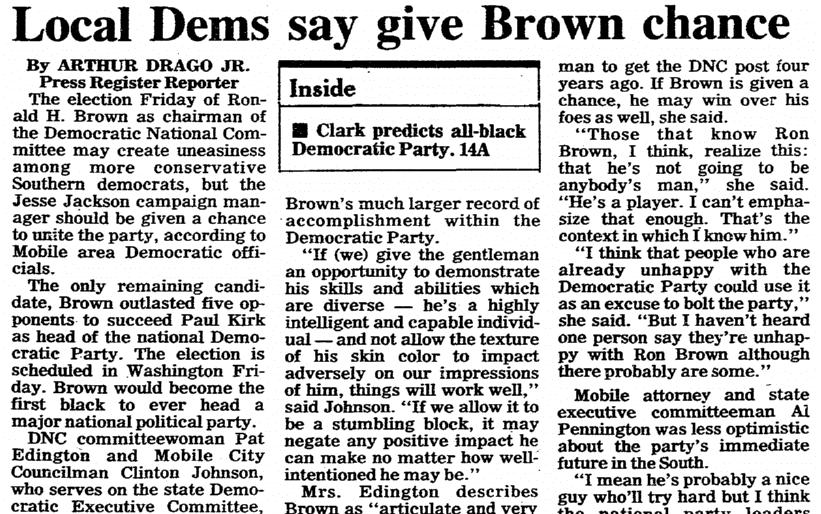Ronald Harmon “Ron” Brown achieved a historic first on 10 February 1989 when he was elected chairman of the Democratic Party – the first African American chosen to lead a major political party in the U.S. Brown came to this position with an impressive set of credentials. A respected and successful lawyer, he worked on Massachusetts Senator Edward Kennedy’s 1980 bid for the presidential nomination, and on Jesse Jackson’s 1988 presidential campaign.

Despite his experience and qualifications, there was a great deal of opposition to an African American being elected chairman of the Democratic National Committee – as shown in the following three newspaper articles. The first article is a news account of his election, while the other two explore reaction to Brown’s election in Alabama, a state at the heart of the unrest and violence of the Civil Rights Movement in the 1950s and 1960s.
Despite these reservations and objections, Brown skillfully played important roles in running the 1992 Democratic National Convention and in Bill Clinton’s successful presidential campaign that same year. President Clinton nominated Brown to be Secretary of Commerce in 1993 – the first African American to hold that position as well – and it was in that capacity that Brown’s life came to a tragic end when he was killed on 3 April 1996 in a plane crash in Croatia while on a trade mission. He was 54 years old.

Here is a transcription of this article:
Brown Takes Helm of Democrats
From wire reports
WASHINGTON – Democratic Chairman Ron Brown, a longtime liberal, yesterday took over a party voters think is slanted too far to the left and to minorities.
He acknowledged that problem in his acceptance speech: “I know some people are wondering just what kind of history we’ve made. Let me speak frankly. I did not run on the basis of race, but I will not run away from it.”
Brown, a respected Washington lawyer-lobbyist, was Jesse Jackson’s convention manager last summer and before that an aide to Sen. Edward Kennedy, D-Mass.
Brown told members of the Democratic National Committee yesterday that “I accept this responsibility beholden to no individual, afraid of no faction and pledged to no institution except the Democratic Party and its members.”
Sen. John Breaux, D-La., urged Brown to create a special committee to develop a strategy to appeal to white moderates.
“The perception is that the party is moving to the left and away from mainstream America,” said Sen. Richard Shelby, D-Ala.
In the last three presidential elections Democrats have won 90% of black votes, two-thirds of Hispanic votes and less than 40% of white votes. Whites are more than 80% of eligible voters, but only two of the top six DNC officers elected yesterday are white.
Brown must reconcile those from the Jackson wing of the party who think Democrats can win by going further to the left, increasing minority turnout and writing off moderate whites with those who argue that that course is foolhardy.
Most moderates give Brown the benefit of the doubt and hope that, like lifelong anti-communist Richard Nixon opening relations with China, Brown also will go against the historical grain.
“If he goes to China, brings the party to the center – there is no one better suited for the job. If he doesn’t, we’re down the tubes again,” said Peter Kelly, former DNC treasurer.
Brown already has taken two positions likely to conflict with Jackson – agreeing to back the winner of the primary in the Chicago mayoral race, even if it’s white candidate Richard Daley Jr., and giving DNC members automatic convention delegate status.
From his childhood, Brown has bridged two very different worlds. He grew up in Harlem, but his parents sent him to predominantly white private schools in the Upper East Side of Manhattan.
He attended Middlebury College in Vermont where he was one of only a handful of black students. At St. John’s University Law School, one of his professors was Mario Cuomo.
Brown ran the Washington office of the Urban League before joining Sen. Kennedy and becoming a senior aide. Later, he became general counsel of the Senate Judiciary Committee.

Here is a transcription of this article:
Local Dems Say Give Brown Chance
By Arthur Drago Jr.
Press Register Reporter
The election Friday of Ronald H. Brown as chairman of the Democratic National Committee may create uneasiness among more conservative Southern Democrats, but the Jesse Jackson campaign manager should be given a chance to unite the party, according to Mobile area Democratic officials.
The only remaining candidate, Brown outlasted five opponents to succeed Paul Kirk as head of the national Democratic Party. The election is scheduled in Washington Friday. Brown would become the first black to ever head a major national political party.
DNC committeewoman Pat Edington and Mobile City Councilman Clinton Johnson, who serves on the state Democratic Executive Committee, believe that Brown’s credentials are in order. They said Brown’s past ties to Jackson and U.S. Sen. Edward Kennedy, D-Mass., may have blinded some Southern Democrats to Brown’s much larger record of accomplishment within the Democratic Party.
“If (we) give the gentleman an opportunity to demonstrate his skills and abilities which are diverse – he’s a highly intelligent and capable individual – and not allow the texture of his skin color to impact adversely on our impressions of him, things will work well,” said Johnson. “If we allow it to be a stumbling block, it may negate any positive impact he can make no matter how well-intentioned he may be.”
Mrs. Edington described Brown as “articulate and very well-organized.”
She suggested that the same people who were upset that Kirk decided to step down are probably the same ones who didn’t want the Massachusetts man to get the DNC post four years ago. If Brown is given a chance, he may win over his foes as well, she said.
“Those that know Ron Brown, I think, realize this: that he’s not going to be anybody’s man,” she said. “He’s a player. I can’t emphasize that enough. That’s the context in which I know him.”
“I think that people who are already unhappy with the Democratic Party could use it as an excuse to bolt the party,” she said. “But I haven’t heard one person say they’re unhappy with Ron Brown although there probably are some.”
Mobile attorney and state executive committeeman Al Pennington was less optimistic about the party’s immediate future in the South.
“I mean he’s probably a nice guy who’ll try hard but I think the national party leaders don’t seem to be getting the message,” said Pennington. “Things have been run this way for the last 20 years and we’ve won only once. Let’s run the plays that win, not the ones that keep losing. I think it’s going to hurt us in the South, nationally anyway.”
“Hopefully, it won’t hurt us locally, both in Mobile and on a statewide basis but this is not going down real well with Deep South Democrats.”
Mrs. Edington and Johnson took strong exception to the remarks of state party chairman John Baker who spoke of seceding from the national party. Pennington, however, felt Baker merely spoke the feelings of many Alabama Democrats.
“If Alabama reacts as Baker proposes it would be absurd, ridiculous,” Johnson said. “I don’t think he needs to maintain that attitude. It’s not productive to people in any walk of life. I would hope that he doesn’t reflect the attitude of most of Alabama. I would like to think we’ve progressed past the 1930s in 1989. I don’t think he needs to be chairman of anything with that attitude.”
“(Baker) doesn’t reflect my feelings at all,” Mrs. Edington said. “I’ve known Ron Brown longer than (state party chairman) John Baker, probably by 10 years. I’ve had an opportunity to watch him in action at the DNC. He’s been an active participant for as long as I’ve known him.”
“If Baker hadn’t said anything (things would be better),” Mrs. Edington said. “Brown’s black and it’s hard for some people to get past that. But once you look at Brown you will appreciate and accept him.”
“John Baker is a good indication of how it’s going to be accepted across the board,” said Pennington. “John is perceived as a liberal. If he thinks Brown’s liberal, it’s gonna hurt in the Deep South. Sam Nunn, Al Gore, Richard Shelby. People like that are going to be able to maintain their credibility. But it’s like they (the DNC) haven’t heard what’s been going on for the last five or six elections.”
Pennington said the opposition is not rooted in racism, but in the feeling that it’s “more of the same stuff. More liberalism, whatever that is, is how it’s perceived.”
“You can’t discount racism to some extent,” Pennington said. “But I really don’t think it has to do with Brown as a black. Personally, I was hoping for a great purge, a catharsis. We should’ve had the catharsis before the chairman was elected though. An old-fashioned truth session where workers say what’s on their minds. We didn’t do it. We blew an extremely good chance to do that, to say the things that needed to be said. We blew an incredible chance to make some changes in the party that would’ve probably been good for everybody. The Democratic Party can’t continue to operate in fear that someone might not support us. You cannot set an agenda based on threats that someone will go somewhere else.”

Here is a transcription of this article:
Clark: Selection of Brown Will Bring All-Black Dem Party
By Bill Poovey
Associated Press Writer
MONTGOMERY, Ala. (AP) – [Alabama] House Speaker Jimmy Clark said the imminent selection Friday of Ronald Brown as national Democratic Party chairman is another step toward the party becoming exclusively black.
But a black lawmaker, Rep. Alvin Holmes, D-Montgomery, disagreed.
Holmes said the party’s selection of the former aide to Jesse Jackson and Massachusetts Sen. Edward Kennedy was forcing white Southerners to finally show their true political colors.
Holmes said he could not understand the objections to Brown by white Democrats.
“I don’t know why they would be afraid of Ronald Brown,” Holmes said. “Ronald Brown has no civil rights record. I’ve never known him to participate in any civil rights demonstration… He grew up with whites, went to school with whites, he always acted white as far as I was concerned. I don’t know why they would be afraid of him.”
Two state senators, John Rice of Opelika and John Amari of Birmingham, both recently bolted the Democratic Party to become Republicans.
“White conservative voters are leaving the Democratic Party,” Clark said. “I think you will see them (Republicans) pick up some additional seats” in the Legislature in 1990.
State Democratic Party Chairman John Baker was out of town Thursday and could not be reached for comment. Baker earlier criticized the pending selection of Brown as the national party leader.
Another black lawmaker, Rep. Bill Clark, D-Prichard, agreed with Holmes that Brown’s selection may free the Democratic Party of some disguised Republicans.
“It’s unfortunate that now all of a sudden that someone that is liberal and black is about to head the party, people are running from the party,” Clark said. “It makes me wonder what their sincerity was and what their position has been all along.”
Both black lawmakers discounted Brown’s affiliation with Jackson during his unsuccessful presidential campaign as the motive for the objections.
“I think that is just a smokescreen, who he has been associated with,” said Clark.
State Sen. Lowell Barron, D-Fyffe, said he has given up hope the Democratic Party will ever turn toward conservatism.
“They are going to continue on their liberal trend until they destroy the party,” he said.
Despite warnings by party conservatives, Barron said, “The Democratic Party continues to lose national elections. It’s getting down to the state level. If they don’t watch out, it’s going to get down to the county and precinct level.”
Note: February is Black History Month in the U.S. To enhance your African American family history research, GenealogyBank’s African American Newspaper Archives span over 170 years, from 1827 to1999, and include 39 newspapers from around the United States.
Don’t narrow your newspaper search to just the mainstream newspapers. Enhance it by utilizing African American newspapers that reflected the concerns of the community (both local and nationwide) and the everyday lives of the people they served. Take some time today to read and get to know GenealogyBank’s African American Newspaper Archives.
Explore over 330 years of newspapers and historical records in GenealogyBank. Discover your family story! Start a 7-Day Free Trial
